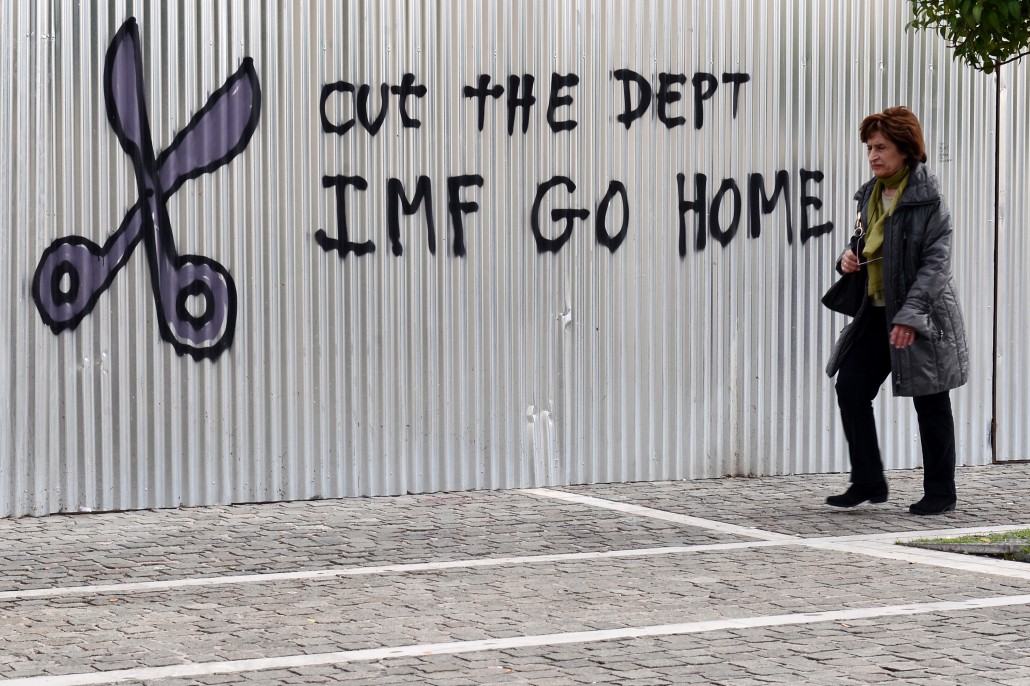
Greek drama before final showdown?
By Peter Wahl, WEED
The drama over Greece is more exciting than a Hollywood thriller. The situation has been escalating daily. There is an increasingly sharper confrontation between Athens, on the one hand, and the power bloc of Berlin, the Eurogroup and the Troika on the other, with a particularly heavy Greek-German conflict in the middle. The new SYRIZA government is trying to obtain an alleviation of its debt burden and wants to end the most perverse effects of the austerity policies. But although an agreement was reached at the end of last February to extend the existing support programme until the end of June, any payment of the promised 7.2 billion euros is tied to the implementation of a “reform programme” – to be adopted and supervised by the Troika. Reforms being undertaken by SYRIZA, such as combating poverty by distributing food ration cards, or granting free access to electricity to the poorest, are not the type of reforms the Troika wants to see or actually approve of.
On the other hand, Greek insolvency would mean its exit from the euro. Against the backdrop of its overall miserable situation, the Grexit would be a political disaster for the EU, in particular under the present geo-political conditions.
Merkel has understood this and declared that she wants to keep Athens in the Eurozone, in contrast to remarks made by several representatives of her party, among them Finance Minister Schäuble, that a Grexit would be tolerable. So her declaration might be an indicator that she will do what she always does in such situations: muddle through. One possible scenario is short-term support for Greece in order to buy time.
As a signal of détente, Merkel had invited Greek Prime Minister Alexis Tsipras to Berlin on 23 March. The result of the visit was mainly to relax the atmosphere between Athens and Berlin. There was no information as to whether anything of substance had been reached. According to the leader of the German Left Party, Gregor Gysi, who met Tsipras after Merkel, a confidential paper would be issued with 18 reform proposals, including higher taxes for the rich and other tax justice measures. Privatisations, however, would not be accepted, nor would an increase in consumer taxes. Greece would continue its “anti-neoliberal policies(opens in new window) ”. Formally, it is up to the next Eurogroup meeting to decide whether the Greek proposals will be accepted. But with Merkel’s move, it would be a surprise if a compromise were not to emerge.
One interesting factor in the power game is Tsipras’ planned visit to Moscow on 8 April to meet Russian President Putin. Greece has already asked the Kremlin for an exemption from Russian counter-sanctions on its agricultural products. Initially the visit was scheduled for May, but has been pushed forward by one month. It is obvious that the option of a closer cooperation with Russia is part of Greece’s strategy and strengthens its position in the conflict.
Meanwhile, time is pressing. According to internal calculations of the EU Commission(opens in new window) , the country will be insolvent after 9 April 2015 if there is no agreement or if an unforeseeable surprise should occur. On this day, payments of over 467 million euros are due to the IMF as well as a refinancing of 2.5 billion euros of public bonds. All in all, Greece has to pay 9.2 billion euros by July – which is unrealistic, even if the 7.2 billion from the Troika are paid out. At the same time, the capital flight is dramatic.In February, 12 billion euros left the country(opens in new window) .
Greek economy still in depression
Before the December elections, optimism was spread by politicians and the media that Greece had finally reached the turning point and an upswing would get underway. EUROSTAT figures (the official statistical service of the EU) for the third quarter of 2014 suggested that the country had a growth rate of 0.7 per cent, which, in fact, was top in the Eurozone(opens in new window) .
However, what EUROSTAT had not said was that the 0.7 per cent growth rate was due to a statistical effect: prices were sinking faster than revenues in this period, which is a typical phenomenon in a deflationary situation, as explained(opens in new window) by Bill Mitchell.
The December 2014 figures for the Greek GDP once again showed the economy shrinking by minus 0.4 per cent, the unemployment rate was at 26 per cent in December 2014 and youth unemployment was at 51.2 per cent. Almost half of the population had lost its medical care and almost a quarter of the school children didn’t have enough to eat.
Crisis management at the impasse
The Greek drama has now lasted for five years. The crisis management by the Troika has failed. If the Greeks continued following the Troika formulas, they would have to live and work for an entire generation under the present conditions in order to pay back a debt burden of 180 per cent of the GDP. It is obvious that neither the debt situation nor the social misery can continue. Sooner or later, the situation could completely spiral out of control. This is why muddling through might at maximum buy some time, perhaps some months, but in the end it will worsen things. A real, substantial solution is required.
However, under the condition that Greece stays in the Eurozone, this means also that the Troika and Berlin need to accept substantial changes. The question is whether they have the willingness and the capability to do so. Because from their point of view, this would be a success for SYRIZA, and that is what they want to prevent for several reasons:
- It would mean that there is an alternative to the austerity paradigm and that the entire logic of the crisis management could be put into question.
- It would create a contagion effect and strengthen PODEMOS in Spain, whose programme is similar to SYRIZA’s. And as elections for the Spanish Parliament are coming up in November 2015, a landslide might be triggered, with other countries following suit.
- For Social Democrats, who support the austerity policies all over the EU, there is the risk of being outcompeted by a left alternative. The example of their Greek sister party, PASOK, which disappeared under the radar of five percent, is the writing on the wall. In particular, the German SPD has taken quite an aggressive stance against a change in the austerity measures.
For all these reasons, one should not have very high expectations of the problem-solving capacity of the EU. For 25 years, there have been hopes that the EU could be reformed and transformed to allow a more democratic and social Europe. But the opposite has happened. The coming weeks will show whether it will be different this time. If there is no break in dependency on the current path, there is no reason for optimism.
Do you need more information?
-

Myriam Vander Stichele
Senior Researcher







